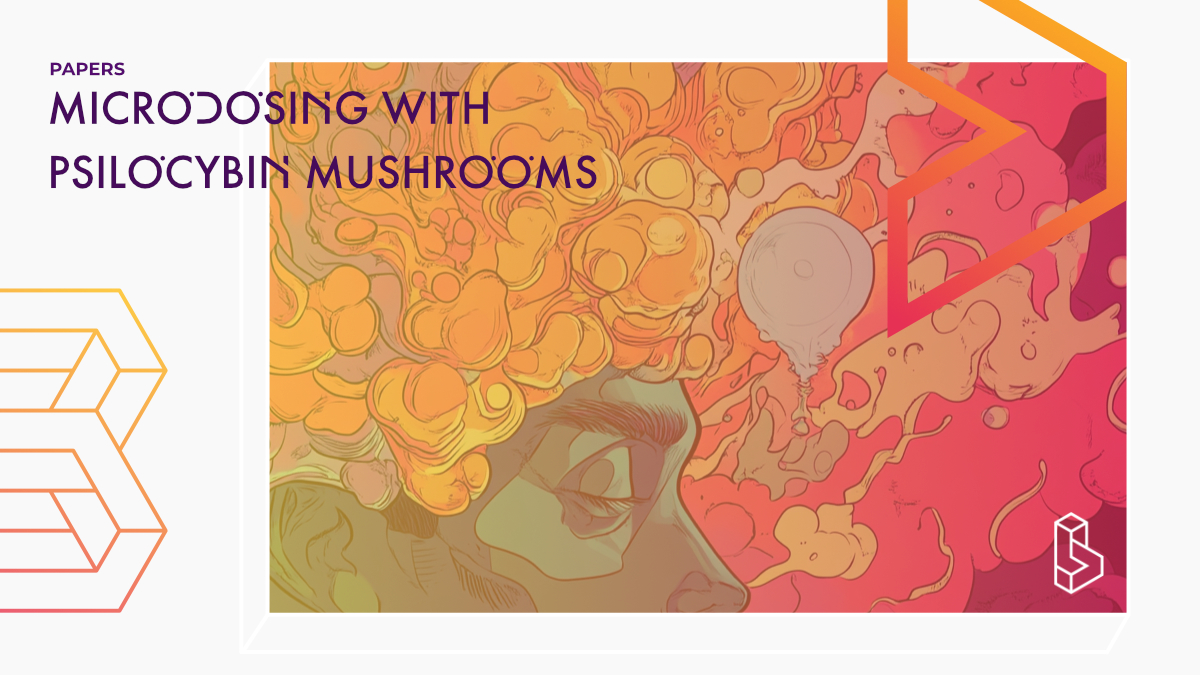This double-blind placebo-controlled study (n=34) explored the effects of microdosing psilocybin (0.5g of dried mushrooms) on subjective experience, behaviour, creativity, perception, cognition, and brain activity. In participants who correctly identified their experimental condition, the acute effects were more intense for the active dose compared to placebo. These effects were accompanied by reduced EEG in the theta band. However, no evidence supported enhanced well-being, creativity and cognitive function. Expectation likely underlies the positive effects of microdosing.
Abstract of Microdosing with psilocybin mushrooms
“The use of low sub-perceptual doses of psychedelics (“microdosing”) has gained popularity in recent years. Although anecdotal reports claim multiple benefits associated with this practice, the lack of placebo-controlled studies severely limits our knowledge of microdosing and its effects. Moreover, research conducted in standard laboratory settings could fail to capture the motivation of individuals engaged or planning to engage in microdosing protocols, thus underestimating the likelihood of positive effects on creativity and cognitive function. We recruited 34 individuals starting to microdose with psilocybin mushrooms (Psilocybe cubensis), one of the materials most frequently used for this purpose. Following a double-blind placebo-controlled experimental design, we investigated the acute and short-term effects of 0.5 g of dried mushrooms on subjective experience, behavior, creativity (divergent and convergent thinking), perception, cognition, and brain activity. The reported acute effects were significantly more intense for the active dose compared to the placebo, but only for participants who correctly identified their experimental condition. These changes were accompanied by reduced EEG power in the theta band, together with preserved levels of Lempel-Ziv broadband signal complexity. For all other measurements there was no effect of microdosing except for few small changes towards cognitive impairment. According to our findings, low doses of psilocybin mushrooms can result in noticeable subjective effects and altered EEG rhythms, but without evidence to support enhanced well-being, creativity and cognitive function. We conclude that expectation underlies at least some of the anecdotal benefits attributed to microdosing with psilocybin mushrooms.”
Authors: Federico Cavanna, Stephanie Muller, Laura A. de la Fuente, Frederico Zamberlan, Matias Palmucci, Lucie Janeckova, Martin Kuchar, Carla Pallavicini & Enzo Tagliazucchi
Summary of Microdosing with psilocybin mushrooms
Over the last decade, the use of small doses of psychedelics to enhance mental function has attracted a significant amount of interest from the general public and the scientific community. However, the effects of low doses of psychedelics have not been extensively investigated to date.
Research suggests that serotonergic psychedelics can produce lasting positive changes in behavior, personality and mental health. Furthermore, some individuals microdose psychedelics to self-medicate for cluster headaches, depression and anxiety, among other conditions.
Microdosing of serotonergic psychedelics is an underground practice that lacks standardized procedures that are accepted and replicated by the community. LSD and psilocybin are the most frequently used compounds, and the most popular dosing schedule is one dosing day followed by two days without dosing.
Find this paper
Microdosing with psilocybin mushrooms: a double-blind placebo-controlled study
https://doi.org/10.1038/s41398-022-02039-0
Open Access | Google Scholar | Backup | 🕊
Cite this paper (APA)
Cavanna, F., Muller, S., de la Fuente, L. A., Zamberlan, F., Palmucci, M., Janeckova, L., ... & Tagliazucchi, E. (2022). Microdosing with psilocybin mushrooms: a double-blind placebo-controlled study. Translational Psychiatry, 12(1), 307.
Study details
Compounds studied
Psilocybin
Placebo
Topics studied
Microdosing
Study characteristics
Original Re-analysis
Placebo-Controlled
Double-Blind
Within-Subject
Randomized
Participants
34
Humans
Authors
Authors associated with this publication with profiles on Blossom
Enzo TagliazucchiEnzo Tagliazucchi is the head of the Consciousness, Culture and Complexity Group at the Buenos Aires University, a Professor of Neuroscience at the Favaloro University, and a Marie Curie fellow at the Brain and Spine Institute in Paris. His main interest is the study of human consciousness as embedded within society and culture.
Institutes
Institutes associated with this publication
University of Buenos AiresUBA is home to the Consciousness, Culture and Complexity & Phalaris Labs. Both labs are led by Enzo Tagliazucchi
Compound Details
The psychedelics given at which dose and how many times
Psilocybin 0.9 mg | 1xLinked Research Papers
Notable research papers that build on or are influenced by this paper
Natural language signatures of psilocybin microdosingThis double-blind placebo-controlled trial (n=34) assessed natural language as a resource to identify speech produced under the acute effects of psilocybin microdoses (0.5g dried mushroom), focusing on variables known to be affected by higher doses: verbosity, semantic variability and sentiment score. Verbosity and sentiment scores significantly differed between groups suggesting that microdosing can be identified from natural speech.

